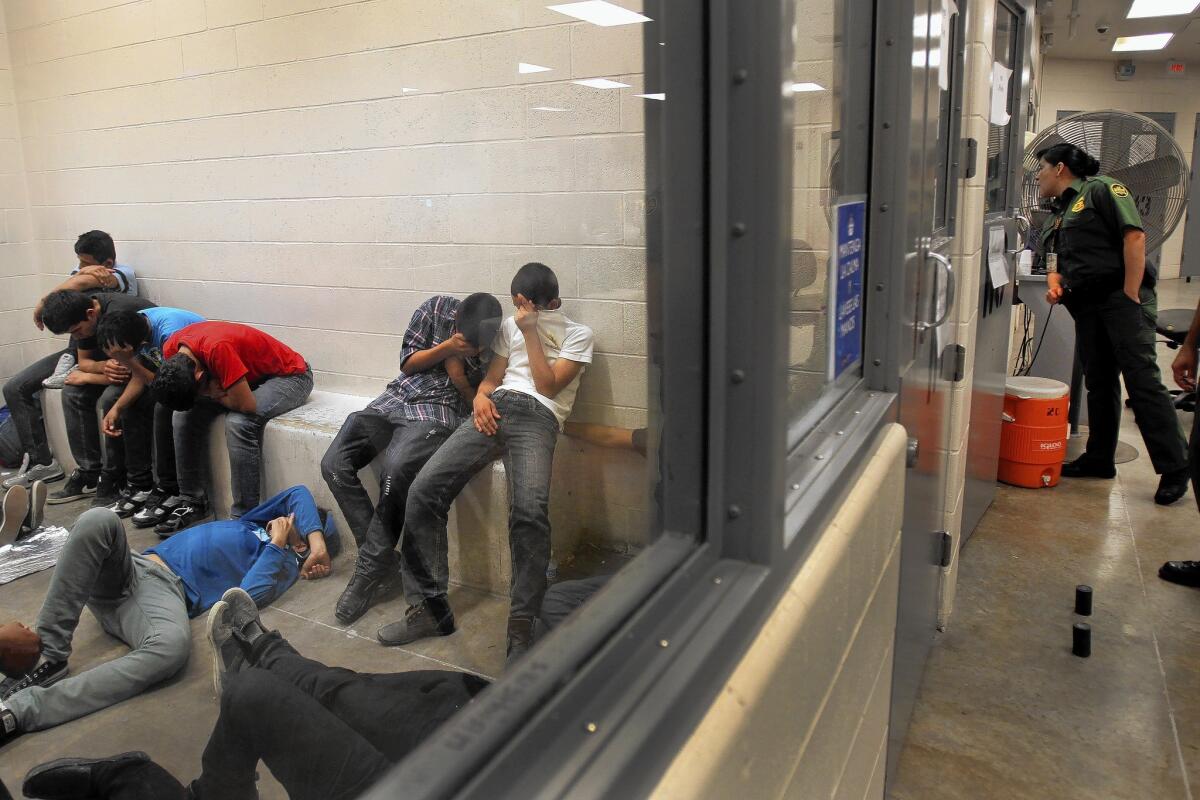Democrats, Republicans in Congress deadlocked on border crisis

Failing to agree on how to handle the crush of children on the Southwestern border, Congress has stalemated amid a fresh round of political brinkmanship that is likely to prolong the crisis and increase federal costs involved.
Rather than compromise over the White House’s request for $3.7 billion to handle the situation, Congress devolved Wednesday into standoff as each side waited for the other to yield on the politically heated issue.
Now, as agencies begin to run out of funds to confront the crisis, the days are dwindling before next week’s adjournment for the August congressional recess.
“We have a refugees crisis on our southern border,” thundered a clearly frustrated Sen. Robert Menendez (D-N.J.) on the Senate floor. “This is about right here, in our own front yard.”
About 57,000 unaccompanied minors, mostly from Central America, have flocked across the border since October, driven by violence in their homelands and rumors that they would be allowed to stay in the United States indefinitely.
The House and Senate introduced proposals this week that would deal with the problem, largely by providing the administration emergency funds to care for the children, review their cases and probably return most of them to their home countries.
Both chambers pared Obama’s request for two years of emergency funds to just this year; the Senate is offering $2.7 billion and the House $1.5 billion.
But that is about where the similarities end.
Ever since the White House suggested it would like to change a 2008 anti-trafficking law to make it easier to deport unaccompanied minors, that issue has become the battleground in the debate.
Advocates for the children swiftly rejected that idea, which they argued would all but do away with judicial hearings for the children by leaving their cases at the discretion of Border Patrol agents.
Similarly, various proposals in Congress that would try to speed up legal proceedings to a maximum seven days — they can now drag out for more than a year, a reality that results in many migrants simply remaining in the U.S. — also have been rejected by those working with the children.
“We will be asking kidnapping and child-rape victims to provide testimony and corroborating evidence in court about the single most horrifying thing that has ever happened to them within one week,” said Lindsay Toczylowski, an immigration attorney at Esperanza Immigrant Rights Project, part of a coalition of California-based legal service providers opposed to changes to the law. She said Border Patrol agents lacked the training to make crucial decisions in complex asylum cases.
California Atty. Gen. Kamala Harris, who was in Los Angeles to speak at the annual conference of the National Council of La Raza, said in an interview that the law’s current protections were there for a reason.
“Anything that is meant to streamline a system for the sake of speed, as opposed to the sake of justice and due process, is something I cannot support,” Harris said.
Most Democrats — including top congressional leaders — have joined the advocates’ side. The administration has slowed its push to amend the anti-trafficking law, even though Homeland Security Secretary Jeh Johnson has testified in Congress that his department needs flexibility in dealing with the problem.
But Republicans have latched on to the proposal to change the 2008 law as the main solution to stem the crisis.
House Speaker John A. Boehner (R-Ohio) wrote in a letter Wednesday to President Obama: “It is difficult to see how we can make progress on this issue without strong, public support from the White House for much-needed reforms, including changes to the 2008 law. I hope you will take the earliest possible opportunity to voice your continued support for common-sense efforts to stem the flow of children to our border.”
Boehner has his own reasons for pushing the president. A House GOP working group’s proposal released Wednesday was unlikely to have a majority of the Republican votes needed for passage, lawmakers said. It called for various measures, such as revising the 2008 law and stepping up border security.
Rep. Ted Yoho (R-Fla.) said he was inclined “not to support it” because of the costs and his preference for enforcing existing immigration laws.
Even those who often have influence in the GOP, including Mark Krikorian, executive director of the Center for Immigration Studies, which advocates for more restrictive immigration laws, were not enthusiastic about changing the 2008 law, saying provisions within it give Obama the power to limit its application without input from Congress.
“I don’t think that Congress should be focusing on changing it because it simply confirms the president’s false narrative that his hands are tied and the border crisis is caused by this law,” Krikorian said.
In the Senate, Democrats tried to entice Republicans to support the administration’s funding request by trimming it to $2.7 billion and including $225 million for the Iron Dome missile defense system in Israel amid the crisis in the Gaza Strip.
Democrats believed the antimissile funding would be too tough for Republican allies of Israel to resist, but GOP senators took a pass Wednesday, seeing the effort as “so transparent,” said Sen. John McCain (R-Ariz.).
Senate Republicans believe public opinion is on their side in supporting change to the 2008 law in a way that would allow speedy removal of the children and that Democrats will have no alternative but to yield.
“They’ll cave,” said Sen. Lindsey Graham (R-S.C.).
Mascaro reported from Washington and Linthicum from Los Angeles.
More to Read
Start your day right
Sign up for Essential California for news, features and recommendations from the L.A. Times and beyond in your inbox six days a week.
You may occasionally receive promotional content from the Los Angeles Times.








